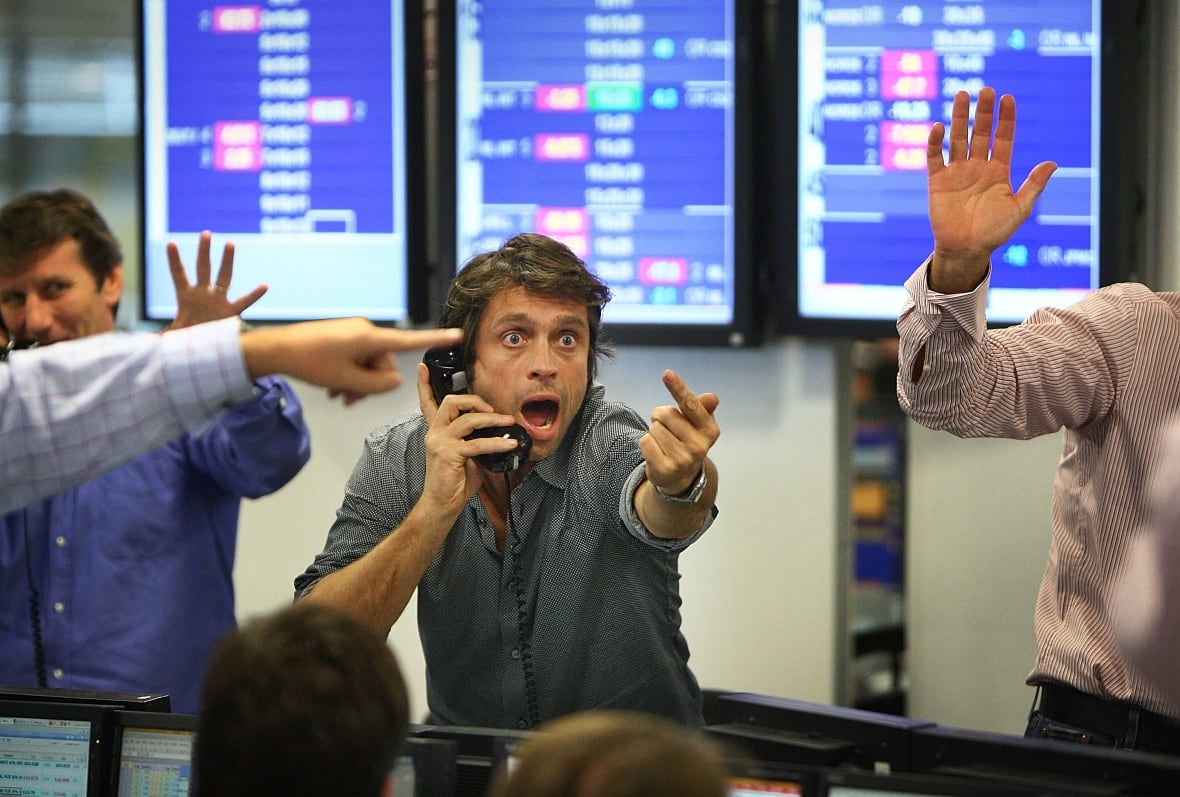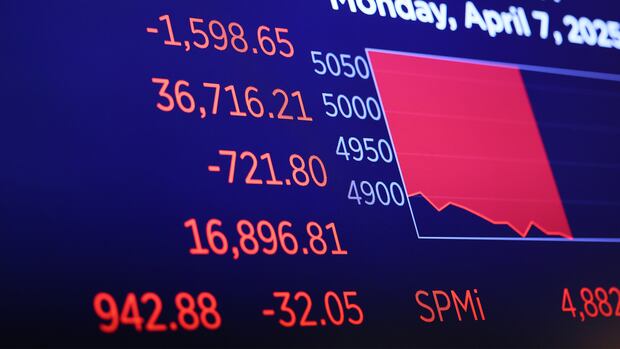The escalating trade war between the U.S. and nearly every single one of its major trading partners has sparked a flurry of predictions and concerns that a global recession could be around the corner.
And economists who spoke to CBC News say one is virtually inevitable, unless we see a big pivot from the U.S. soon.
“I don’t know how we would avoid it,” Mark Zandi, chief economist at Moody’s Analytics, told CBC News’s Power & Politics on Monday.
“This is a pretty dark scenario, both for the U.S. and, by extension, Canada and the rest of the world.”
In the wake of U.S. President Donald Trump announcing sweeping global tariffs last week, the brokerage firm J.P. Morgan put the chances of a global recession at 60 per cent, up from 40 per cent at the end of March.
As countries counter U.S. President Donald Trump’s global tariffs, Moody’s chief economist Mark Zandi tells Power & Politics a global recession is likely to hit in June or July and ‘there is no going back’ if the U.S. is unable to de-escalate soon.
“We haven’t seen this type of tariff trade war in a 100 years,” said Moshe Lander, senior lecturer of economics at Concordia University, referring to when the U.S. doled out tariffs after the stock market crash of 1929.
Those tariffs backfired when Washington’s trading partners retaliated, he said.
‘Entering one as we speak’
A recession is traditionally defined as two consecutive quarters of losses in a country’s GDP. In a global recession, those losses would occur across multiple economies worldwide, says Tu Nguyen, an economist with RSM Canada.
There’s no “set-in-stone” definition for how many countries need to be in turmoil, she said, but with major economies including China and the European Union all facing trade uncertainty amid heavy U.S. tariffs, the writing on the wall is clear.
“If the U.S. does not change its policy stance on tariffs… we would expect a recession to be defined in the next six months,” Nguyen said.
“I think it’s reasonable to say that we are entering one as we speak.”
Zandi predicts that the U.S. would begin to feel the effects of a recession by June or July if Trump “doesn’t find an off-ramp.”
The clash between the U.S. and China, the “two largest economies on the planet by orders of magnitude,” is one of the biggest hurdles, he said.
Investors around the world are raising alarm bells after a third day of tariff-related market chaos, with one billionaire Trump ally even warning that not pulling back on tariffs could unleash a ‘self-induced, economic nuclear winter.’
After China matched Trump’s tariffs, he levied even more — meaning that, when those latest tariffs kick in on Wednesday, imports from China will be a stunning 104 per cent.
“If both countries keep raising their tariffs tit for tat, we’re going to end up with very little trade between the two countries and the fallout from that is just going to be very difficult to overcome,” Zandi said.
Global vs. national recessions
A global recession isn’t felt equally across all countries. For instance, during the global financial crisis of 2008, Canada went through a period of reduced economic activity, but “did quite OK, all things considered,” Nguyen said.
However, Canada’s positioning in this upset isn’t looking good.
Andrew DiCapua, principal economist with the Canadian Chamber of Commerce, says that while Canada appeared to have been spared by last week’s tariffs, “the reality is, if the U.S. slips into recession, Canada and Mexico will inevitably feel the worst of the impact, given how integrated our economies are.”
WATCH | Tariffs could trigger ‘economic nuclear winter’:
Exactly how global tariffs will impact Canada’s GDP or job market won’t be apparent for months, although March saw a decrease of 33,000 jobs amid tariff fears, reversing the growth seen at the end of last year.
But economists predict that as global tariffs make goods less accessible and more pricey, consumers will retreat from purchases and investments, dampening demand and increasing the likelihood of layoffs.
“Layoffs are already starting, especially in sectors closely tied into U.S. supply chains, like autos, and we’re beginning to see that reflected in labour market data,” DiCapua said.
Reduced hiring and more businesses going under will follow in a recession, making it harder to get raises or change jobs. Meanwhile, life will get more expensive.
“The typical American household will have to spend $2,100 [US] more a year to buy the same goods as they are today,” if things don’t change, Zandi said.
There’s still a way to avoid a global recession, but that would depend on the U.S. drastically reducing or eliminating its tariffs entirely.
“The off-ramp to avoid this has to come from the U.S.,” Nguyen said, adding that speed is of the essence.
“The longer this goes on, the more layoffs will happen, the more factories would just shut down because they can’t operate under the new tariffs’ rules.”
The Trump administration has scheduled talks with South Korea and Japan, and Italian Prime Minister Giorgia Meloni is due to visit next week. But right now, all country-specific tariffs are moving forward.
“The important thing to remember is that this is entirely self-induced by the U.S.,” Nguyen said. “It’s not something that we were blindsided by like the COVID-19 pandemic, for example. But it’s having an impact on the entire world.”



